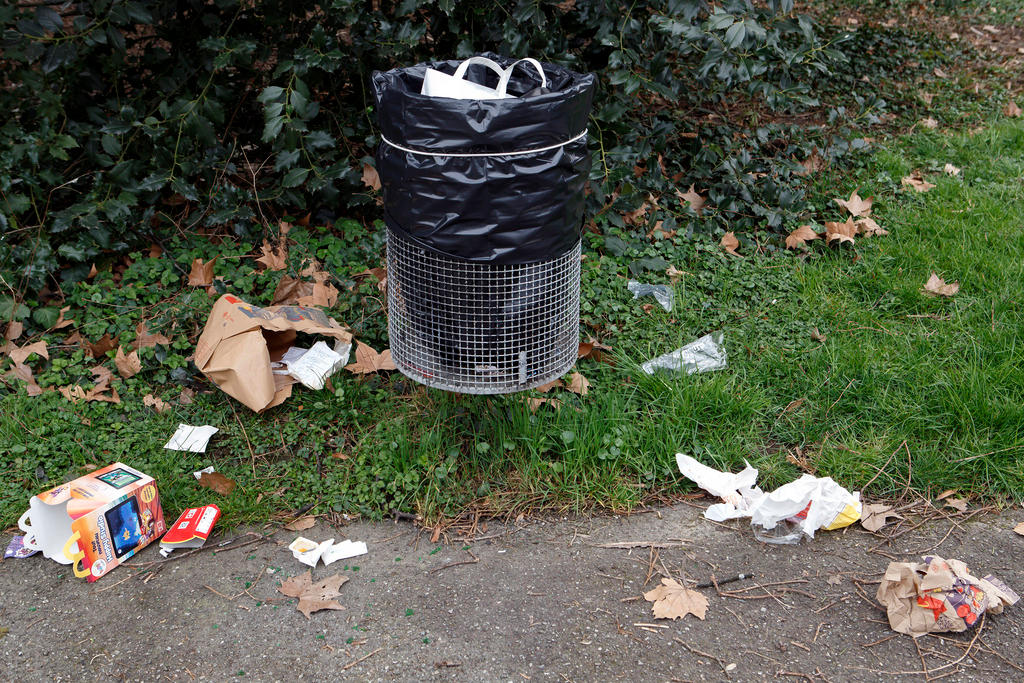
What does it take to keep Swiss streets so clean?

The perception of cleanliness in Swiss cities likely has more to do with investment in sanitation efforts than a lower production of waste than other countries.
According to the Federal Statistics OfficeExternal link, the nation produces about 24 million tonnes of trash every year, about 24% of whichExternal link is urban waste.
In 2014, Switzerland generated 730 kilogramsExternal link (1,609 pounds) of waste per person per year – the greatest amount in Europe after Denmark (758 kg).
Processing and disposing of all that waste is expensive, especially when it takes the form of street litter. The Swiss Federal Office for the Environment estimates that in total, littering costs the nation almost CHF200 million ($203.4 million) in clean-up expenses per year.
Between 1990 and 2012, the amount of urban waste in Switzerland grew by 30%, along with the population and economy. City sanitation practices have had to adapt to keep up with the deluge:

More
Fined for littering
- In the capital city of Bern (population 140,000), street sweepers run daily, picking up about 8.5 tonnes of rubbish a day. The city’s 1,300-odd trash bins are emptied up to ten times a day, and about 15,000 hours per year are devoted to cleaning the city’s fleet of public buses and trams. In 2002, city officials staged a demonstration by refusing to clean the streets for 24 hours, allowing trash to pile up, with the goal of “shaming” residents into littering less.
- In Geneva (population 200,000), a team of 200 city employeesExternal link is responsible for keeping the city’s 220 kilometres (137 miles) of roads clean seven days a week, as well as tidying up parks. Public spaces are also washed to remove dirt, dust, and pet waste. About 3,000 trash containers are located throughout the city, and seven cleaning crews are responsible for emptying them.
- The city of Zurich (population 400,000) Civil Engineering and Disposal DepartmentExternal link collects about 30,000 rubbish bags every day, and staff work “around the clock” to clean up 737 kilometres of public roads and 1,080 kilometres of sidewalks and footpaths, as well as all stops on Zurich public transport. The city provides an appExternal link to help residents keep track of household rubbish disposal schedules and proper practices.
In 2016, the Swiss parliament rejected a government plan to instate a federal law requiring a fine of up to CHF300 ($305) from litterbugs, on the grounds that it would create too much of a bureaucratic hurdle. But as of May 2017, the Federal Council is again trying to pass a modified law that includes a CHF200 fine for failing to dispose of waste correctly.

In compliance with the JTI standards
More: SWI swissinfo.ch certified by the Journalism Trust Initiative















![The four-metre-long painting "Sonntag der Bergbauern" [Sunday of the Mountain Farmers, 1923-24/26] had to be removed by a crane from the German Chancellery in Berlin for the exhibition in Bern.](https://www.swissinfo.ch/content/wp-content/uploads/sites/13/2025/12/01_Pressebild_KirchnerxKirchner.jpg?ver=f05a5a9c)















You can find an overview of ongoing debates with our journalists here . Please join us!
If you want to start a conversation about a topic raised in this article or want to report factual errors, email us at english@swissinfo.ch.